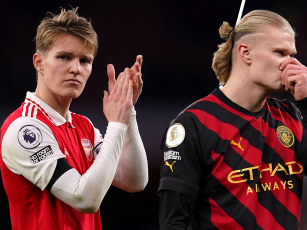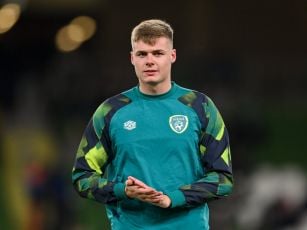For the first time since 1998, FIFA will have a new president and the election on Friday, February 26th will decide the identity of the newcomer.
It will be one of the following five men: UEFA General Secretary Gianni Infantino, South Africa's Tokyo Sexwale, ex-FIFA official Jerome Champagne, Asian football chief Sheikh Salman and Prince Ali of Jordan, who lost to Blatter during last summer's shortlived poll.
Each candidate is making promises about how they will run FIFA into a new era, away from the corruption-tainted period that was blown open in front of the public last year with arrests and revelations on a regular basis.
But what is each candidate proposing? Well, let's kick things off with their plans for FIFA's showpiece event, the World Cup.
FIFA World Cup
The flagship tournament, which is held in Russia next time before the very controversial decision to take it to Qatar in 2022, will always be fought over.
Often candidates will propose an expansion of the World Cup from its current 32 teams to the detriment of quality but a cynic could see that as a means of currying favour with Confederations likely to benefit from increased finals places.
So how FIFA's candidates dealt with the tournament in their manifestos and public comments?
Infantino: He wants the World Cup to not only be expanded to 40 teams but also hosting would take place regionally rather in the one or two-country model. UEFA's Euro 2020 will take place across 13 host cities around Europe which acts as a precursor to the idea.
Ali: He supports an increase in the number of teams at World Cups from 2026 and adds that he will "guarantee that no Confederation will face a reduction in World Cup slots". As for, the process of host bidding, Ali wants "a formal continental rotation system" in place.
Salman: While he says such a promise should not be used as an "election tool", the Bahraini official says "increasing the number of teams that can participate in the World Cup will certainly help football to develop". When it comes to the question of hosting other FIFA tournaments, he wants "specific (not standard) criteria" to be used in order for more countries to have the opportunity to host FIFA-sanctioned competitions.
Sexwale: The South African also wants to see World Cups with more than 32 teams. On the question of bidding, he says, the "recent occurrence of awarding two World Cups simultaneously should never be repeated" in reference to the way the 2018 and 2022 bidding process was timed.
Champagne: He states that he is not in favour of an expansion to 40 teams because of the organisational demands that would entail.
But he does intend to "immediately launch a broad discussion on the allocation of the 32 spots" which could see changes in how many places are available to each Confederation. The way in which he highlights how African and American sides managed at the last World Cup may be a hint that those regions could benefit from increased spots at the expense of other parts of the globe.

FIFA presidential candidate Jordanian Prince Ali Al Hussein speaks at the National Press Club in Washington. Prince Ali is one of the five candidates to succeed Sepp Blatter as FIFA President on Friday, Feb. 26, 2016. Prince Ali is asking for Friday's election to be suspended in a dispute over voting procedures. (AP Photo/Susan Walsh, file)
Cleaning up a tainted organisation
Infantino: While the UEFA General Secretary calls for FIFA to become "a credible, trusted and transparent global governing body", his manifesto details more steps to getting there. Among his pledges are the introduction of term limits, to "implement strict and independent control over money flows and the creation of a FIFA Council "to replace the FIFA Executive Committee".
He also calls for a separation of executive powers and governance between the FIFA Council and FIFA Administration.
Ali: Like Infantino, he also raises the need for "transparency", as well as a fairer and more equitable distribution of revenue around FIFA Member Associations.
On the issue of transparency, he wants "accurate minutes of FIFA Executive Committee meetings and other Standing Committees" to be published. He also pledges to end the system of "awarding commercial contracts without bids or via a secretive process".
His term limit pledge is maximum of two consecutive four year mandates for FIFA presidents and members of the Executive Committee.
Salman: As president, he says he would take up a "non-executive role" in order to empower the professional staff to manage the day to day business under a CEO working according to best practice".
To counteract corruption, he pledges to "evaluate the creation of a global integrity and anti-corruption agency, jointly owned and run by sports bodies with law enforcement bodies around the world".
Sexwale: Transparency is also the "watchword" for this candidate, who promises to create a "FIFA Independent International Advisory Board" composed of 11 "eminent" personalities to critique the organisation.
Emphasising that "football cannot be controlled from Zurich", he pushes for the influence of the individual confederations.
He also highlights putting focus on potential football growth areas like China and India, poorer parts of Europe and the developing world.
Champagne: He pledges to make his salary public if he becomes FIFA president. He also adds that he would intend "to inform the Commission of Ethics and the Audit Commission of the state of my personal assets at the start of his term".
He also wants to put in place cost reductions of 5% at FIFA.

FIFA Presidential candidate Jerome Champagne attends a mini-forum on the future of FIFA at the EU parliament in Brussels. 5 FIFA presidential candidates meet in Miami on Friday Feb. 12, 2016 with the elections hardest-to-read voters who are deep in their own leadership race amid a financial crisis. The 35 FIFA voting federations from North and Central America and the Caribbean could be decisive in the Feb. 26 election. (AP Photo/Geert Vanden Wijngaert, File)
Additional promises
Infantino: He calls for an open debate on "the further use of technology in the game".
Ali: He calls for greater investment in related disciplines of beach soccer and futsal, while - like Sexwale - he speaks of boosting women's soccer.
Salman: He raises the issue of doping, saying that it should "not be put on the backburner" and that "complacency is the biggest doping threat to football". In a more constructive sense, he emphasises the importance of the quantity of testing.
Sexwale: Could international teams have sponsors logos on their jerseys, which is currently not allowed under FIFA rules? Under Sexwale, he promises "to seriously explore the possibility of having the national jersey, as happens in other sporting codes, bearing the logo of the main sponsor".
Champagne: The Frenchman wants a "global collective bargaining agreement" negotiated between clubs and players.
Download the brand new OffTheBall App in the Play Store & App Store right now! We've got you covered!
Subscribe to OffTheBall's YouTube channel for more videos, like us on Facebook or follow us on Twitter for the latest sporting news and content.








